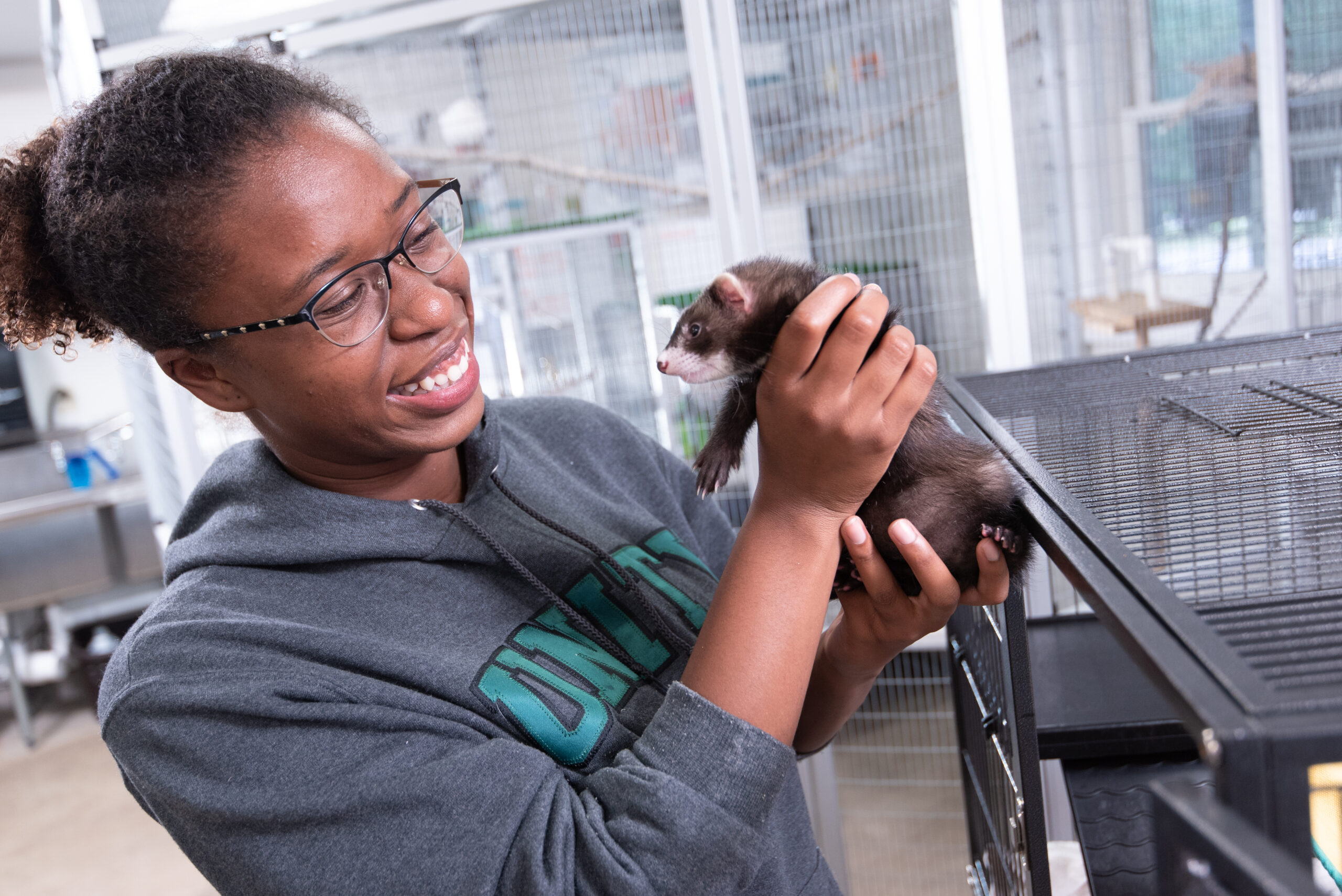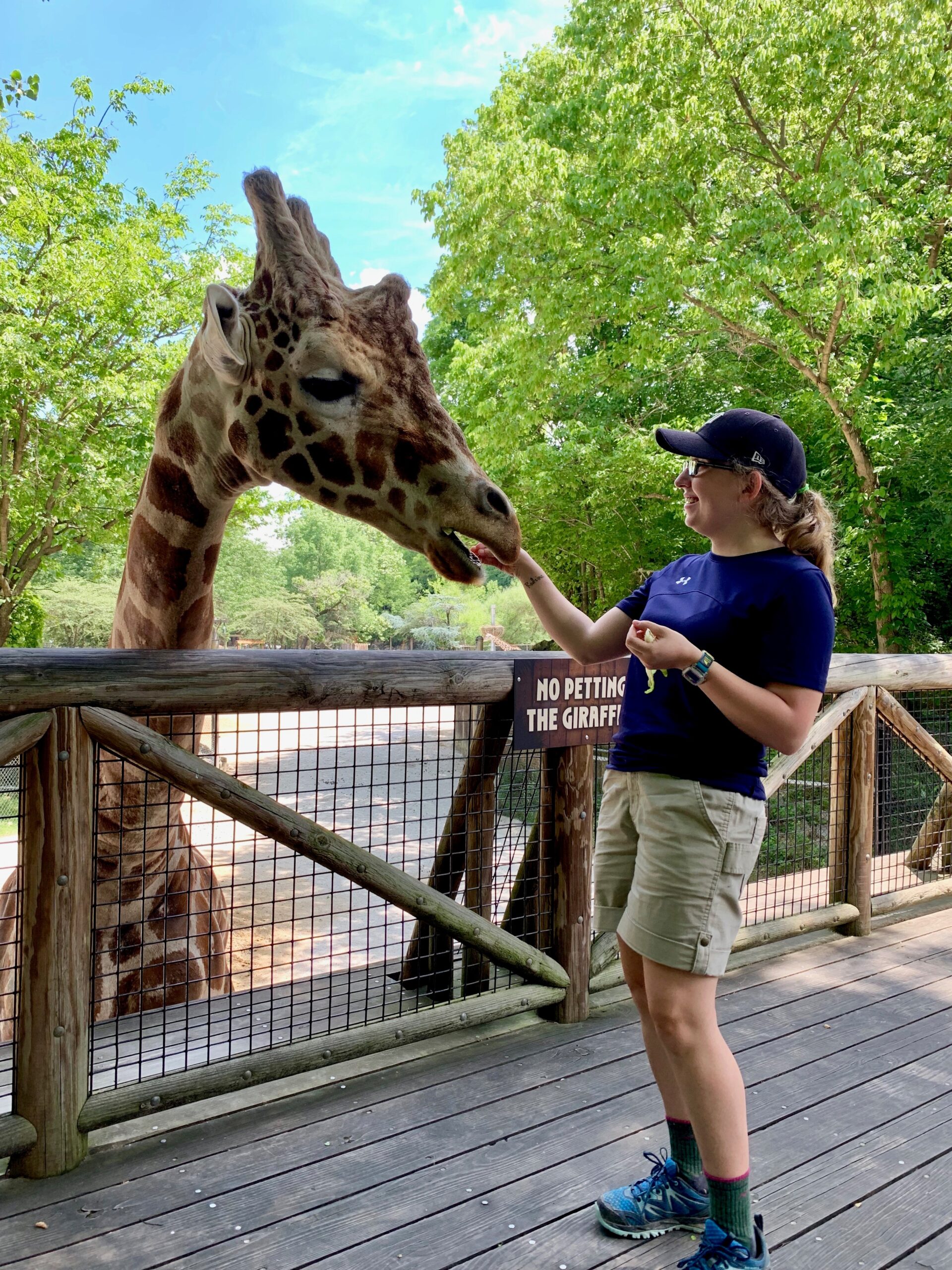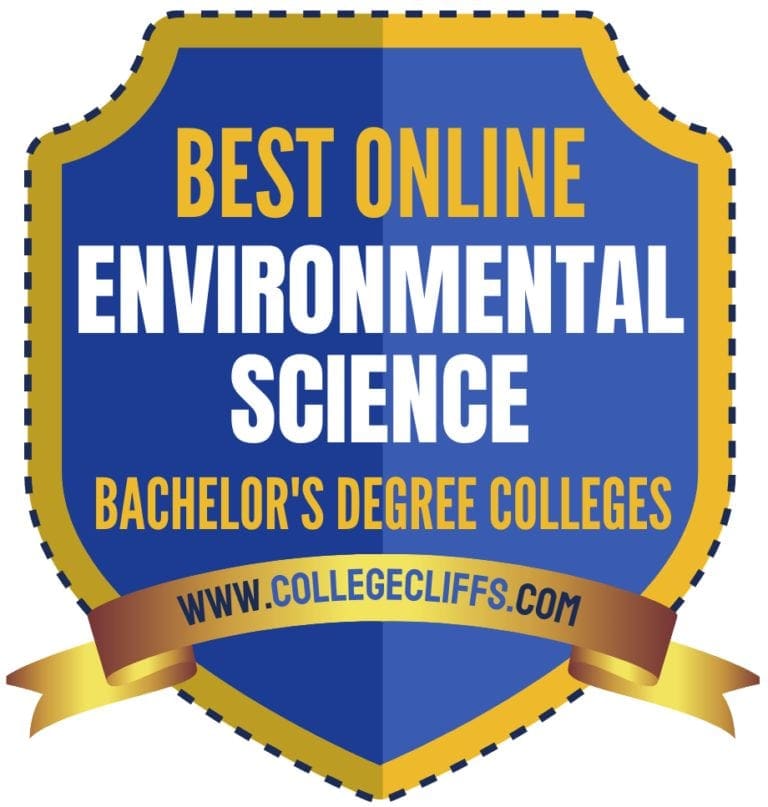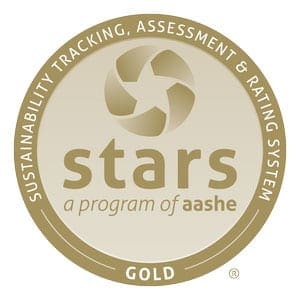Rehabilitate and Care for Captive Wildlife
For those seeking an exhilarating career as a wildlife rehabilitator, conservation specialist, animal educator, wildlife rehabilitator, animal caretaker, or veterinary sciences, Unity’s bachelor degree in Wildlife Care and Rehabilitation offers a pathway to achieve those goals. With a holistic approach encompassing animal science, wildlife ecology, animal enrichment, and management, augmented by specialized instruction in cutting-edge animal rehabilitation techniques, policy formulation, animal training methodologies, students are empowered to embark on impactful careers in zoos and aquariums and in wildlife conservation and rehabilitation. The program’s crowning feature is a hands-on internship experience, providing invaluable real-world exposure and practical skills essential for making a tangible difference in the preservation of our planet’s biodiversity and the habitats in which they thrive.
Wildlife Care and Rehabilitation Highlights
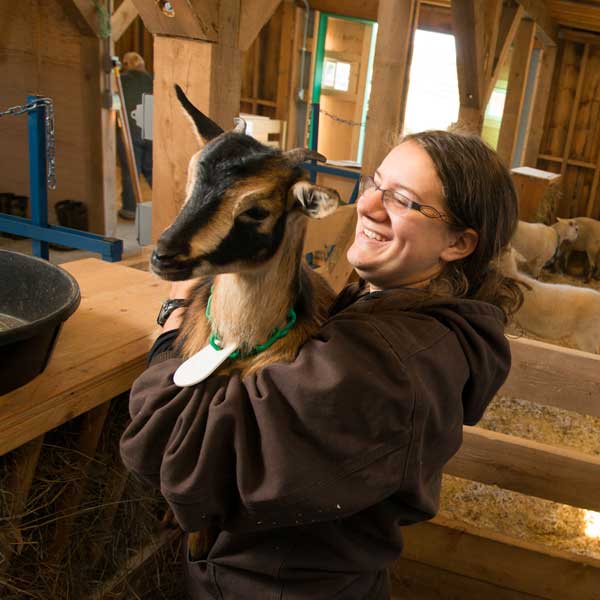
Educational Design
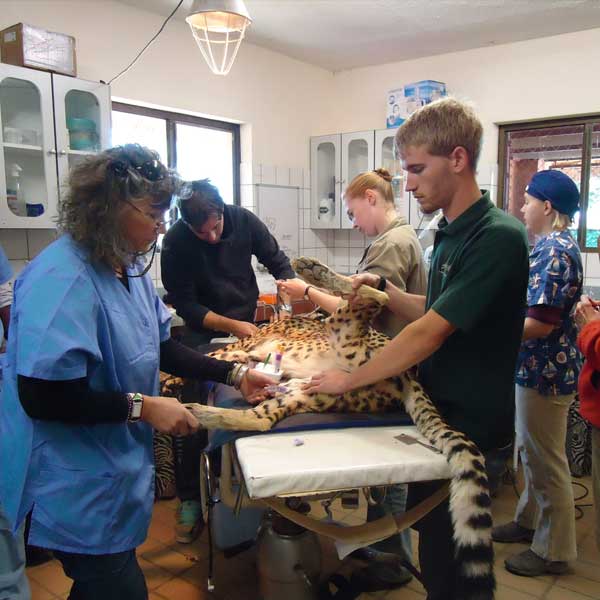
Career Connections
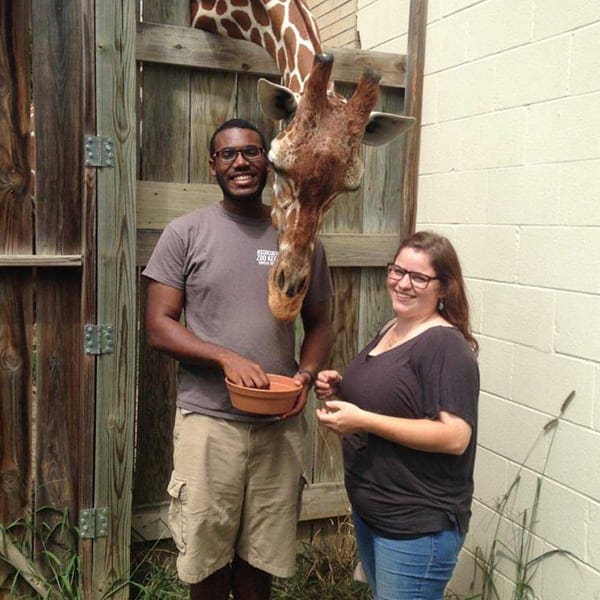
Global Reach
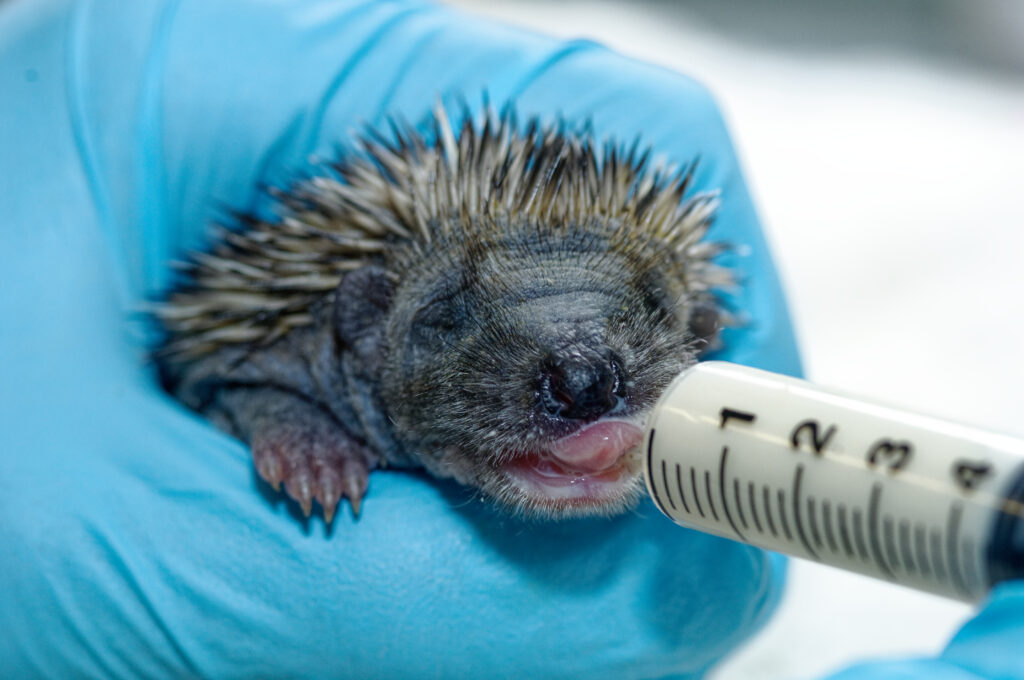
What Students Study
In addition to liberal arts foundation courses and a specific seminar on captive wildlife care, students study various courses in animal health, training, and handling; enrichment and exhibit design; and wildlife conservation and preservation.
Through hands-on learning, students gain the experience and skills needed to become a wildlife care professional employed in a zoo, aquarium, museum, rehabilitation clinic, or other facility housing captive wildlife.
Course List
To earn a Baccalaureate degree in Wildlife Care and Rehabilitation, you must complete:
- General Education Core: 43 credits
- Program Core: 43 credits
- Electives: 34 credits
University Wide Requirements: A minimum of 120 earned credit hours, 30 credits at the 300 level or above, a minimum of 30 credits earned at Unity, and an overall cumulative GPA of 2.0 or above.
General Education Core
ART 1001 Creative Expressions: Art and the Natural World | 3 Credits
Unleash your creativity and develop artistic skills as you engage with the intricate beauty of the natural world and explore and reflect on the forms, structures, and patterns of nature. This dynamic course emphasizes personal expression over technical perfection, ensuring a space for artistic exploration. Uncover how the environment can shape your artistic voice through a variety of traditional and digital art media and techniques. Through hands-on projects, demonstrations, and interactive activities, you’ll draw connections between art and science, fostering a deeper understanding of both. Communicate your vision and provide peer feedback in a supportive, in-person learning community, setting the stage for a future where art and ecological consciousness intersect.
Credits: 3
Prerequisites: None
BIO 1001 Nature’s Kaleidoscope: Exploring Life’s Diversity | 3 Credits
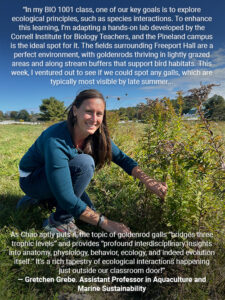 Explore the breathtaking diversity of life on Earth. In this course, you will delve into the realms of macroevolution, organismal structure and function, and the dynamic interactions within ecosystems. Through practical applications and cutting-edge industry practices, students will uncover the mechanisms of evolution and the intricate forms and functions of diverse organisms. This course integrates engaging hands-on activities, immersive fieldwork, and detailed case studies, equipping you with the skills and knowledge necessary to thrive as an environmental science and sustainability professional.
Explore the breathtaking diversity of life on Earth. In this course, you will delve into the realms of macroevolution, organismal structure and function, and the dynamic interactions within ecosystems. Through practical applications and cutting-edge industry practices, students will uncover the mechanisms of evolution and the intricate forms and functions of diverse organisms. This course integrates engaging hands-on activities, immersive fieldwork, and detailed case studies, equipping you with the skills and knowledge necessary to thrive as an environmental science and sustainability professional.
Credits: 3
Prerequisites: None
BIO 1002 Nature’s Kaleidoscope: A Laboratory Exploring Life’s Diversity | 1 Credit
Discover the wonders of biological diversity through Nature’s Kaleidoscope: A Laboratory Exploring Life’s Diversity. This course offers an immersive and interactive lab experience, revealing the intricate patterns and processes that shape life on our planet. Through hands-on experiments and engaging activities, you’ll explore the rich tapestry of life, honing your scientific inquiry skills. This course prepares you for careers in environmental science and sustainability by providing practical knowledge and laboratory expertise.
Credits: 1
Prerequisites: BIO 1001 (or concurrent enrollment)
CAR 1001 Essential Skills for Success and Career Planning | 1 Credit
This 1-credit course equips students with essential skills to excel in their studies and transition smoothly into their chosen careers. Students will engage in strategic goal setting and explore career paths using design thinking principles. Key activities include conducting industry research, participating in relevant career and industry events, and developing a personalized career plan. Additionally, students will gain valuable insights into critical thinking, self-advocacy, and effective use of campus resources.
Credits: 1
Prerequisites: None
CHM 1001 Chemistry in Action: From Theory to Practice | 3 Credits
Explore the fascinating world of chemistry, where you will dive into atomic theory, investigate the fundamental components of matter, master chemical bonding, and uncover molecular structure and reactivity. Additional emphasis is placed on nomenclature, stoichiometry, orbitals, electron configurations, the periodic table, intermolecular forces, aqueous solutions, and basic chemical reactions. Learn to balance chemical equations and explore key reactions such as acid/base, precipitation, and redox. This course equips students with essential knowledge needed to tackle the intricate environmental issues of tomorrow.
Credits: 3
Prerequisites: None
COM 1001 Rhetoric in Nature: Writing for Environmental Impact | 3 Credits
Immerse yourself in the art of effective communication, an essential skill for success in environmental and sustainability careers. This course blends interactive workshops with collaborative sessions that enhance your professional writing skills. Learn to craft compelling narratives, reports, and persuasive texts for diverse audiences, with a focus on organization, evidence-based writing, clarity, and cohesion. Develop strategies for drafting, revising, and refining your writing, and become a more impactful communicator ready for professional challenges.
Credits: 3
Prerequisites: None
COM 2001 EcoMedia: Storytelling for Sustainability | 3 Credits
Dive into the dynamic world of EcoMedia, where the power of storytelling meets environmental advocacy. EcoMedia uses various media platforms and communication strategies to inform, educate, and engage the public on environmental issues. Learn to craft compelling environmental narratives through social media, podcasts, video, and print, promoting sustainability and influencing public policy. Engage in hands-on projects that explore the transformative power of storytelling to shape public perceptions and drive positive environmental actions. Develop skills in media production, strategic communication, and ethical reporting to effectively convey stories. Prepare to become a persuasive advocate for the environment, equipped with the tools to make a meaningful impact through media.
Credits: 3
Prerequisites: None
COM 3001 Messages that Resonate: Creating Impactful Communication | 3 Credits
Elevate your communication skills to make a significant impact. Learn and apply sophisticated techniques for crafting persuasive messages and compelling campaigns. Engage in practical exercises and case studies to analyze and develop effective communication strategies. Gain expertise in leveraging digital tools, engaging with diverse stakeholders, and addressing complex ethical considerations. Develop essential skills to effectively convey your messages to diverse audiences, preparing you for success in today’s dynamic job market
Credits: 3
Prerequisites: None
ENV 1001 The Life Blood of Our World: Rivers, Lakes, and Streams | 3 Credits
Dive into the dynamic world of rivers, lakes, and streams! Discover the science and significance of freshwater ecosystems as you explore their endless diversity. Students from all programs discover how these vital water bodies are more than just scenic landscapes; they are the lifeblood of our ecosystems and societies. See firsthand through immersive field trips and interactive projects how these waterways support diverse wildlife, drive local industries and recreation, and play a crucial role in enriching communities. Inspired by the boundless opportunities for protecting and preserving our precious natural resources, this course prepares you to make a transformative difference in your future career.
Credits: 3
Prerequisites: None
ENV 2001 Environmental Resilience: Tackling Climate Challenges | 3 Credits
Dive into one of the most pressing and intricate challenges of our time – climate change. This course takes students on a journey to explore the profound effects of climate change on ecosystems, wildlife, and human societies, both locally and globally. Immerse yourself in climate data analysis, modeling, hands-on projects, and field experiences that equip you to address these challenges head-on. The course culminates with innovative strategies for climate mitigation and adaptation, empowering you to develop sustainable solutions and prepare for careers as environmental professionals. This course is not just about learning, it’s about making a difference in the world. Are you ready to take on the challenge?
Credits: 3
Prerequisites: None
EVJ 3001 Ethics at Work: Practical Approaches to Decision-Making | 3 Credits
Navigate the complexities of ethical decision-making, a crucial skill for creating a just and equitable world. Learn practical strategies, tools, and techniques to discern ethical implications and make informed decisions. Plunge into ethical philosophy to understand the foundations of ethical awareness and action. Engage with case studies to develop your ability to distinguish difficult decisions from true ethical dilemmas. Practice deliberating on a variety of ethical issues drawn from social and professional contexts, preparing to lead with integrity and make impactful, ethical choices in your career and beyond.
Credits: 3
Prerequisites: None
HIS 2001 The Past is Present: America’s Environmental History | 3 Credits
Immerse yourself in the dynamic narrative of America’s environmental history from pre-Colonial times to the present. Explore how human societies and natural environments have continuously shaped each other through pivotal events like the Dust Bowl and the environmental movement of the 1960s and 1970s. Engage with digital archives and artifacts to uncover ecosystem transformations, industrial impacts, and cultural shifts. Participate in hands-on activities, field trips, and real-world case studies that bring historical analysis to life. This course not only provides critical insights into the past but also equips you with the skills to address contemporary environmental challenges, preparing you for impactful careers.
Credits: 3
Prerequisites: None
INT 4001 Environmental Impact Internships: Career Pathways OR CAP 4001 Pioneering Change: Capstone in Environmental Solutions | 3 Credits
INT 4001 Environmental Impact Internships: Career Pathways
Embark on a transformative journey with the Environmental Impact Internship, where academic knowledge meets real-world practice. Envision yourself collaborating with seasoned professionals, addressing pressing environmental issues, and expanding your professional network. This internship experience provides a distinctive combination of practical experience and thoughtful reflection, equipping you wit the essential skills for a successful career. You’ll take charge of diverse tasks, strengthen your skills, and grow your potential as an environmental professional. This hands-on approach will also enhance your problem-solving and leadership skills in preparation for your future career.
Credits: 3
Prerequisites: 60 credits
May be taken more than once for up to twelve credits. All credits beyond three count as elective credits.
CAP 4001 Pioneering Change: Capstone in Environmental Solutions
Step into the final, thrilling phase of your academic journey with Pioneering Change: Capstone in Environmental Solutions. This course brings together the knowledge and skills you’ve acquired throughout your degree to confront real world environmental challenges. Working in diverse teams, you will develop impactful solutions and present them through a professional-grade project. This immersive experience hones your problem-solving and communication abilities, showcasing your readiness to potential employers to address critical environmental issues. Get ready to make a lasting impact on the world!
Credits: 3
Prerequisites: At least one 4000-level major core course and 60 credits. Or 90 total credits.
LDR 4001 Inspiring Action: Transformational Leadership Strategies | 3 Credits
Become a catalyst for positive change. Reflect on your personal leadership style, learn to build meaningful relationships, and understand the impact of leadership within complex systems. Through case studies in various sectors such as business, government, nonprofit, community, and education, examine organizational behavior and culture, and practice consensus building and project management to drive effective change. Develop practical tools that will empower you to navigate and lead effectively in your future career, ensuring you are equipped to inspire and manage transformational change.
Credits: 3
Prerequisites: 60 credits
MTH 2001 Data is Power: Drawing Insights from Statistics | 3 Credits
Unlock the power of data and develop insights into pressing environmental issues. Apply essential statistical tools to collect, analyze, and interpret data about real-world environmental challenges such as pollution, biodiversity, and climate change. Engage in hands-on exercises, case studies, and real-world applications crucial for environmental research, monitoring, and management. Gain proficiency in statistical software and data visualization to make meaningful impact in your career and contribute to sustainable solutions for our planet’s future.
Credits: 3
Prerequisites: None
PSY 1001 Mind Matters: An Introduction to Psychology | 3 Credits
Dive into the fascinating world of psychology, uncovering its historical roots and modern advancements. Explore the core subfields: biological, developmental, cognitive, social, and mental health. Develop the skills to critically evaluate psychological research and methodologies, empowering yourself as a knowledgeable consumer of psychological insights. Participate in engaging projects that integrate diverse psychological perspectives, deepening your understanding of human behavior. Gain essential transferable skills including critical thinking, problem-solving, effective communication, and a deep understanding of human behavior that are critical for success in any professional environment.
Credits: 3
Prerequisites: None
Program Core
ANM 2001 Taming the Wild: Foundations of Animal Care and Training | 3 Credits
Venture beyond the confines of ordinary animal care into a realm where compassion meets expertise. This course delves into the essential practices of maintaining habitats and ensuring sanitation, all while emphasizing the highest standards of care. Students will be introduced to the nuanced techniques of training both domestic and wild animals, focusing on husbandry, handling, and healthcare. Detailed observation and meticulous data collection are key components, preparing you to excel in the field of animal training and care with a keen eye for detail and a heart for animal welfare.
Credits: 3
Prerequisites: None
ANM 2002 Feeding for Health: Essentials of Animal Nutrition | 3 Credits
Discover the fundamentals of animal nutrition, focusing on the dietary needs for health and well-being of various species. Examine the functions of nutrients, digestive processes, and the science of feed formulation. Develop practical skills in creating and evaluating nutritional plans through hands-on activities and real-world projects that prepare you for successful careers in veterinary science, wildlife conservation, and animal husbandry
Credits: 3
Prerequisites: None
ANM 3001 Instinct and Action: Decoding Animal Behavior | 3 Credits
Explore the intricate behaviors of animals through the lens of evolution, physiology, and ecology. Delve into the genetic and environmental influences that shape animal behavior, investigating how these behaviors contribute to survival and reproduction. Engage in hands-on activities, dynamic discussions, and immersive fieldwork to examine behaviors such as social interactions, communication, mating strategies, and survival tactics like predator avoidance and foraging. Develop insights and skills that prepare you for a fulfilling career in wildlife care and rehabilitation.
Credits: 3
Prerequisites: BIO 1001
ANM 3002 DNA to Diversity: Animal Husbandry and Genetics | 3 Credits
Unlock the secrets of animal genetics and conservation in this dynamic course. Explore the principles of genetic inheritance, genetic drift, and quantitative and molecular genetics. Learn to design and optimize breeding programs that enhance genetic traits and sustain population health. Gain practical experience in managing genetic resources through hands-on projects, field trips, and case studies. Prepare to become a leader in animal conservation, equipped to address the challenges of preserving genetic diversity and promoting sustainability in various environments.
Credits: 3
Prerequisites: BIO 1001
ANM 4001 From Rescue to Release: Wildlife Rehabilitation Techniques | 3 Credits
Discover the professional techniques used in wildlife rehabilitation, from rescue to release. Learn practical techniques used to assess and treat injured wildlife, ensuring they are ready to return to their natural habitats. Engage in complex, real-world scenarios and learn from leading experts in the field. You’ll develop skills designing rehabilitation protocols and observing release strategies. By the end of this course, you’ll be prepared to contribute significantly to wildlife conservation and rehabilitation, making a profound impact on the preservation of our natural world.
Credits: 3
Prerequisites: ANM 2001, ANM 3001, CWC 1001
BIO 2002 Exploring Ecosystems: Structure and Function | 3 Credits
Venture into the intricate web of life, uncovering the complex interactions between organisms and their environments. Examine energy flow, nutrient cycles, and the delicate balance of ecosystems. Engage in hands-on fieldwork and in-depth case studies to develop practical skills in analyzing population dynamics and ecosystem functions. Prepare to tackle real-world environmental challenges and apply these skills in your future career.
Credits: 3
Prerequisites: BIO 1001, MTH 2001
BIO 2003 Microscopic Marvels: Exploring Cell Biology | 3 Credits
Unlock the secrets of cell biology. Investigate the intricate details of cell structures, metabolism, and molecular genetics. Discover how cells communicate and orchestrate life’s processes. Engage in practical exercises and apply biological practices to develop a deep understanding of cellular functions. Build essential skills for successful and rewarding careers in environmental and sustainability fields.
Credits: 3
Prerequisites: BIO 1001, CHM 1001
BIO 3001 Structural Secrets: Comparative Animal Anatomy | 3 Credits
Explore the fascinating world of animal anatomy through comparative studies that highlight the incredible diversity of life. Engage in hands-on activities including dissections and microscopic examinations to uncover how different species are uniquely adapted to their environments. Develop practical expertise in analyzing, comparing, and understanding anatomical adaptations in this immersive course and build skills for successful careers in wildlife biology, veterinary sciences, or environmental conservation.
Credits: 3
Prerequisites: 60 credits
BIO 3002 Adaption in Focus: Comparative Animal Physiology | 3 Credits
Investigate the internal systems of animals, from the cellular to the organ-system level. Focus on thermoregulation, and the circulatory, respiratory, endocrine, and nervous systems. Examine processes supporting organismal homeostasis in animals in wild and captive environments. Analyze how environmental challenges impact physiological strategies and responses, affecting animal health and well-being. Develop skills in evaluating data collection methodologies for research and veterinary care through applied practical tasks and real-world examples, preparing for a career in wildlife biology, veterinary sciences, or environmental conservation.
Credits: 3
Prerequisites: BIO 3001
BIO 3003 Life’s Balance: Biology in Conservation | 3 Credits
Uncover the science behind biodiversity preservation and ecosystem management. Delve into population biology, habitat restoration, and conservation policies and gain practical skills to help protect our natural world. Through interactive sessions and applied case investigations, you’ll tackle real-world conservation challenges and acquire the expertise to make a significant impact.
Credits: 3
Prerequisites: BIO 1001
CHM 1002 Chemistry in Action: Practical Laboratory Skills | 1 Credit
Discover the fascinating world of chemical reactions and their applications in everyday life. Embark on an exciting exploration of chemistry through immersive laboratory experiences designed to ignite your curiosity and practical skills. Explore techniques such as spectrophotometry and titrations while learning the importance of safe laboratory practices. Led by expert instructors, you’ll gain confidence in conducting experiments, analyzing results, and applying principles of chemistry in real-world contexts.
Credits: 1
Prerequisites: CHM 1001 (or concurrent enrollment)
CWC 1001 Safe Havens: Caring for Captive Wildlife | 3 Credits
Step into the crucial role of a wildlife caretaker. Learn practical skills and knowledge essential for maintaining habitats and ensuring sanitation with the highest standards of care. Explore the intricacies of animal behavior, nutrition, and health maintenance. Engage in hands-on activities with expert guidance to design enriching environments that promote the well-being of captive wildlife. This course prepares you for a fulfilling career in wildlife management, where your expertise will contribute to the conservation and ethical treatment of animals.
Credits: 3
Prerequisites: None
CWC 3001 Thriving Habitats: Enrichment and Exhibit Design | 3 Credits
Discover the art and science of designing enriching environments for captive animals. Explore the principles of habitat creation across diverse settings such as zoos, aquariums, and wildlife preserves. Learn to craft environments that engage animals, promote natural behaviors, and enhance health outcomes and welfare. Acquire the skills needed to innovate and improve animal care practices through hands-on activities and real-life examples. Get ready to shape the future of animal welfare and conservation with your innovative designs and ideas!
Credits: 3
Prerequisites: CWC 1001
EVJ 3002 From Acts to Action: Natural Resource Law and Policy | 3 Credits
Discover the essential role of law and policy in managing and protecting our natural and wildlife resources. Delve into the intricacies of environmental legislation, regulatory processes, and policy development at local, national, and international levels. Examine key laws such as the Clean Water Act, the Endangered Species Act, and the National Environmental Policy Act, analyzing their impacts through case studies and real-world applications. Develop essential career skills that prepare you to navigate the legal landscape, advocate for sustainable practices, champion future policies, and positively contribute to sustainable resource management and conservation in your own way.
Credits: 3
Prerequisites: None
WLD 2001 Exploration Quest: North American Wildlife | 3 Credits
Immerse yourself in the rich biodiversity of North American wildlife. Investigate the biology, ecology, and conservation of various species across the continent. Engage in hands-on activities such as identifying wildlife, assessing habitat needs, and examining population dynamics. Explore contemporary conservation strategies through interactive fieldwork and case studies and prepare for a rewarding career dedicated to protecting and managing wildlife resources.
Credits: 3
Prerequisites: None
Sample Course Offerings within the Major:
- Care of Captive Wildlife
- Cell Biology
- Ecology
- Comparative Animal Anatomy
- Comparative Animal Physiology
- Conservation Biology
- General Chemistry I Laboratory (1cr)
- Animal Training
- Animal Nutrition
- Wildlife Rehabilitation Techniques
- Wildlife Policy and Administration
- North American Wildlife
- Animal Behavior
- Enrichment and Exhibit Design
- Animal Husbandry and Genetics
Earn your degree. Unlock new opportunities!
Average yearly salary for Wildlife Biologist
Average 10-year projected growth in animal care jobs
Download the BS Wildlife Conservation Flyer
Degree Requirements and Courses
The Wildlife Conservation degree requires 120 credits, including 30 that must be completed at the 300 level or above. You may transfer in up to 90 credits from outside accredited institutions. For more details, browse our Wildlife Conservation degree checklist. View our full course catalog for a better look into your program, then apply online for free to get started.
How much does it cost?
Your online education should be affordable and manageable. Our team of distance education concierges will work with you through the admissions process to help you plan and pay for your degree. Learn more about the costs here.
How fast can I finish?
Our comprehensive 120-credit program can be tailored to fit your schedule and goals! Completion time is flexible, determined by the number of credits you choose to take each term (8 terms/year) and less time with transfer credits. Without transfer credits, you can anticipate the following completion times:
- 24 credits/year: Complete in just 5 years
- 30 credits/year: Achieve your degree in 4 years
- 48 credits/year: Fast-track your education in only 2.6 years
How many credits can I transfer?
Apply online (it’s free!) and a distance education concierge will reach out to create an individualized plan for transferring your credits. You may also want to try estimating your transfer credits using Transferology.
What courses will I be taking?
For course requirements, browse our Wildlife Conservation checklist or view our full course catalog for a better look into your program. Then apply online for free to get started.
Do you have more information that I can download?
Program Features
High Value Education: Nationally recognized for the quality of our programs delivered at an affordable price.
Social Mobility: Unity ranks in the top 15% of colleges in the U.S. for fostering upward mobility.
Sustainability Core: All programs are committed to sustainable practices, preparing you for a future of environmental awareness in all fields.
Flexible Learning: Balance work and education effortlessly by choosing when and where you want to study.
Flexible Start Dates: 8 start dates per year allows you to control your schedule
Personalized Guidance: Benefit from individualized academic and professional advising, where we are dedicated to turning your career and academic aspirations into tangible achievements.
Transfer-Friendly: Shorten your academic timeline, since we accept up to 90 credits to value your prior academic achievements.
Ready to Learn More?
Fill out the form below to speak with someone at Unity about the Distance Education programs. We look forward to hearing from you!
"*" indicates required fields
Experts in the Field
At Unity Environmental University, our faculty is composed of a wide range of environmental science experts who in addition to teaching, conduct their own research and various fieldwork.

Dr. Megan Linske
Instructor of Wildlife Biology
Unlock the power of scientific communication with Dr. Megan Linske! In the dynamic world of research, effective outreach is key, and Dr. Linske is your guide to mastering it. With a background in public outreach for the Connecticut Agricultural Experiment Station, Megan not only conducts groundbreaking research but also translates complex findings into accessible insights.
As a seasoned communicator, Megan enriches her students with the art of conveying research knowledge. Ready to bridge the gap between science and the public? Join Dr. Linske in decoding the secrets of impactful communication in the realm of conservation and experimentation!
FACULTY PROFILES
Seek out knowledge.
Learn from leaders.

Dr. Megan Linske

Dr. Sasha Tetzlaff

Brian Ahlers
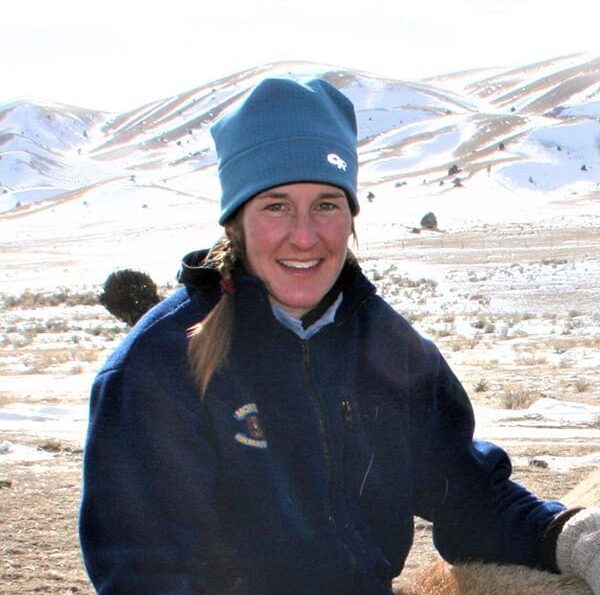
Dr. Kelly Proffitt


